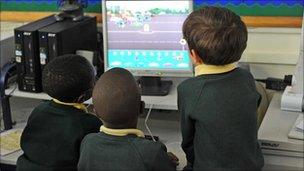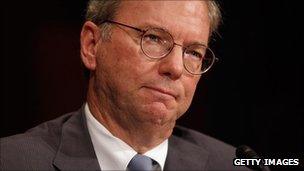Can the UK raise its game?
- Published
- comments
Is lack of computer science teaching failing pupils?
Where are the jobs and economic growth of the future going to come from? The creative industries, and notably the games business, is one answer.
But, as we explain in a film for Newsnight tonight, games industry executives do not believe that our education system can deliver the skills it needs to compete globally.
The industry veteran Ian Livingstone, the man behind Lara Croft, told us that the UK could be proud of its record in creating world-beating games - but the future does not look so bright.
"We're very very good at making games - but we need the skills. We need computer scientists, animators, artists and there aren't enough of them," he said.
And like many across the wider technology industry, he blames our skills shortage on ICT, the subject which is the current mainstay of computer education in our schools:
"Somehow the classroom got hijacked by ICT. And that is learning about Powerpoint, Word, Excel - useful but boring after more than a week of learning it. "
In a report for the government called Next Gen, Livingstone and his co-author Alex Hope, call for computer science to be brought into the national curriculum, external, and for a programme to recruit the best teachers to the subject.
Secretarial skills
The idea is that, instead of dull lessons in handling office productivity software, a new generation would be taught to get their hands dirty with programming - "teach our kids to code" is the slogan of a growing movement calling for change.

How early should children be taught computer science?
We visited one school in Cambridge where computer science is taught, albeit at A-level. Both the teacher and the students in the class we filmed at Long Road Sixth Form College felt too much time was being wasted earlier in the education system.
One teenager told us that ICT classes had been pointless - "they teach you to be a secretary."
And Adam McNichol - one of the few teaching this subject who has a computer science degree - told us the whole education system needed to change, so that the value of the subject was recognised.
Apparently, quite a few of his best students drop computer science at A-level because top universities are still sniffy about it.
We also visited David Braben, the man who created the legendary game Elite in the 1980s and went on to run a successful games business.
I've written before about his Raspberry Pi project, which aims to put a £15 computer in classrooms to teach a new generation to code.
Arts/science divide
That prospect is coming closer, with the charity planning to bring out a first version of the device by the end of the year. But Braben agrees that there is a wider cultural issue, with a lack of respect for the sciences from those in the arts:
"If you're a scientist, and you don't know a particular artistic question you get sneered at - but with the reverse, there's no expectation that a guy who knows about arts would know about technical questions."
It is an subject which was raised by the Google chairman Eric Schmidt in a speech in Edinburgh in August, where he expressed amazement that computer science was not taught in British schools.

Google's boss says the UK is "throwing away" its "great computing heritage"
That has given the movement pressing for change some serious ammunition.
Ian Livingstone, whose report is currently awaiting a response from the government, believes that the Department for Culture, Media and Sport understands the issue - but fears that the Department for Education is not listening.
But over recent weeks I have heard from dozens of people - from ICT teachers to games industry executives to school students - who are passionate about the need for change.
And this revolution may be pushing at an open door.
A government desperate to prove it has a growth strategy is in the mood to listen to those who say Britain can be a winner again in an industry that marries the arts and sciences.